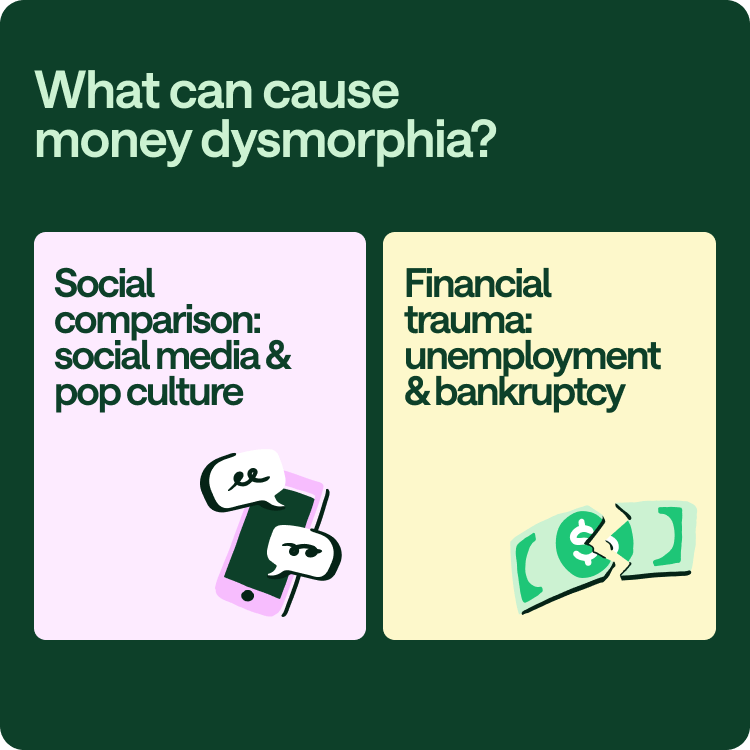All it takes is a quick scroll on social media to start questioning how everyone else can afford their lavish lifestyles. With reel after reel of clothing hauls, Italian vacations, and fancy restaurants, it’s easy to wonder where you could have done better with your finances. But what you see on social media isn’t always reality.
Even with a healthy savings account, an emergency fund, and enough money to invest, you may be left stressing about why you can’t afford what your peers and favorite influencers are repping on TikTok or Instagram. This feeling of financial inadequacy is called “money dysmorphia.”
Third-party brands and companies are mentioned for informational purposes only. Chime does not sponsor, endorse, or partner with any of these brands or companies, and they do not sponsor or endorse Chime.
What is money dysmorphia?
Money dysmorphia is when your financial thoughts and behaviors don’t line up with your actual situation. While it’s not a clinical diagnosis, it’s similar to “cognitive dissonance,” which is a feeling of psychological discomfort that happens when your beliefs and actions don’t match.
For instance, you might say you value financial stability but keep splurging on things you don’t need and building up credit card debt.
On the other hand, you might say you value travel and new experiences but don’t allow yourself to spend money on these things.
Money dysmorphia can cause you to make financial decisions out of step with your goals and situation, potentially having negative effects on your financial and mental health.
What causes money dysmorphia?
While every generation has its share of money concerns, members of Gen Z are feeling the financial stress. In a recent survey, half of Gen Zers said financial worry affected their mental health the most.¹
After years of high inflation, rising interest rates, a lack of affordable housing, and a higher cost of living, it’s no wonder Gen Zs are feeling worried about their financial futures. But outside of the current economic climate, other factors may contribute to dysmorphic thinking.

Social comparison
Social comparison theory says that we come to know ourselves through comparison with others.² In other words, we look to outside images to make sense of who we are.
While humans have always done this, the outside images we compare ourselves to today have changed significantly. Instead of comparing to a small friend group, social media allows us to compare ourselves to influencers, athletes, models, and actors worldwide.
If you dream of being part of this elite and wealthy group, social comparison theory says you’ll copy certain behaviors to appear similar. Maybe you start buying things you can’t afford or saving every cent to try and achieve the same level of financial success.
Financial trauma
Examples of financial trauma can include unemployment, bankruptcy, and homelessness. All of these experiences can affect your feelings and behaviors about money.
If you grew up struggling to make ends meet, you could develop a scarcity mindset – feeling like there’s never enough to go around. As a result, you might save every cent you make.
Alternatively, if you grew up feeling like you never fit in because your family couldn’t afford certain things, you might have a habit of overspending, going into debt to try and look the part and boost your sense of self worth.
8 ways to overcome money dysmorphia
If you feel like you’re experiencing money dysmorphia, there are several things you can try to make it go away.
1. Be honest with yourself
Step one is recognizing your money patterns. Whether it’s overspending, hoarding, or feeling shame about money, you need to understand you money habits before you can do anything about it.
2. Identify your triggers
Next, identify the triggers that make you feel like you don’t have enough or that motivate you to spend too much. For instance, if you notice that you start to obsess about money while scrolling on your phone, consider taking a break from social media or unfollow certain people.
You can also try:
- Setting daily time limits on your social media apps
- Deleting apps from your phone that trigger you
- Filling your time with people and activities that make you feel fulfilled
3. Know your values
Take some time to think through your values. What is important to you? Do you really care about fancy vacations and designer outfits, or is it just that you’re overexposed to these things and feel like you need to keep up with the Joneses?
As you think things through, write down your values in a journal or on your phone so you can refer back when you need a reminder.
4. Educate yourself
When it comes to any subject, knowledge is power. The more you know about your finances, the better equipped you are to make solid financial decisions.
Look for websites, blogs, and podcasts you can consume to improve your financial literacy.
5. Make a budget
A budget is a plan for your money. Rather than spending with no intention, a budget helps you keep track of your money. It’s an easy way to set financial boundaries so you can work towards your money goals. You can do an old-school budget on a piece of paper or download a budgeting app on your phone.
You can also try different budgeting methods like the 50/30/20 method. This method proposes 50% 0f your money goes toward your needs, 30% towards your wants, and 20% goes to savings.
If you struggle with overspending, you can try the envelope system. This is when you set spending limits for different expense categories such as groceries, entertainment, and gas. Then, you put the exact amount of cash into each envelope. When the money in an envelope is gone, you can’t spend any more on that category until the following month.
6. Find an accountability partner
While some people are uncomfortable talking about money, you shouldn’t feel like you have to keep your money issues a secret.
If you’re struggling with your financial situation or have questions, find an accountability partner in your inner circle who you can regularly check in with to discuss your spending.
7. Move your body
Whether you walk, run, swim, or skate, moving your body can improve your mental health.³
While solo activities are great, joining a team sport may have a unique benefit – research shows that socializing with others can reduce depressive symptoms.³
To get yourself in a good headspace, join a team sport that’s outside in the fresh air and sunshine.
8. Ask for help
If you need to work out some deep-rooted financial trauma, consider speaking to a mental health professional. For help with money basics, including budgeting, saving, investing, and getting out of debt, connect with a financial advisor.

To work on both your mental and financial well-being at the same time, look for a financial therapist. You can check out sites like the Financial Therapy Association⁴ to start your search.
You're more than your money
Very rarely do we know the details of someone else’s money situation. So while it may seem like everyone is way ahead of you financially, you’re not seeing the full picture. Maybe it’s all smoke and mirrors. They might have a nice car but mountains of credit card debt.
It’s tempting to compare yourself to influencers, but take the time to understand what you value, create a budget you can stick to, and seek professional advice if you need it to set you up for financial success.

 Log in
Log in
